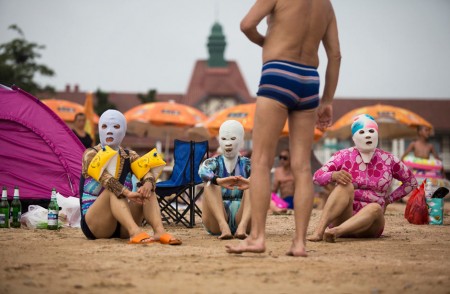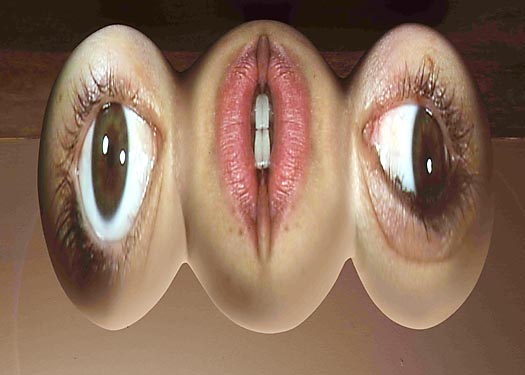
I have been wondering a lot recently at the various afflictions connected to warfare: most of them falling under the heading of Post Traumatic Stress Disorder (PTSD). This was once called *shell shocked* after the first world war. I guess PTSD sounds better, more clinical, more hygenic.
And then I weas wondering at the (seeming) high numbers of people being diagnosed with some form of autism.
Thirdly, I have been thinking about theatre. So, let me open with some thoughts on theatre. When I participated at the Padua Hills Playwrights Festival, I was aware of how unique it was to be working outdoors. I think everyone who sees plays performed outdoors is aware of the sky above. That awareness is linked in subtle ways to the realization that theatre performed indoors is a more Renaissance conceit (though it is more complicated than just that) and that it is part of a privileging of the spectator’s viewpoint.

The Constant Prince, dr. Jerzy Grotowski
If we go back to Greek tragic theatre, the first thing to note is that these were outdoor plays. They were also meant to be inclusive of the audience (in other words, the spectator’s p.o.v. was not privileged). The actors no doubt could not look over the heads of the audience.
“The Greek theatre masks covered the entire head. All documentation shows that up tothe end of the 5th
century theatre masks were closely fitted to the head. The size was
probably not larger than the head, and the masks had rather small mouth and eye open-ings. On the masks depicted on ceramics both the whites and the pupils of the eyes are painted, suggesting that the eye holes of the original masks were as small in size as the pupils of a living person.According to my research this feature helped the actor to concentrate, acting as a lens to
focus the actor‟s attention. As the gaze is directed through this construction, the optic
field becomes very narrow and after a while the actor has the feeling that he is looking through one single eye hole -a “third eye” –
placed in the area between the eyebrows.The gaze is directed to one point, rather like a lens that focuses the rays of light. The minimization of the sight leads to the maximization of the listening to the other actors,to a different awareness of their presence based not so much on seeing but on hearing. It leads the actor to the act of
akroasis,
the act of conscious and active listening.”
Thanos Vovolos

This is very important. In fact, crucially important if we want to begin to understand what has happened to theatre as an art form, and also to understand the wider society of neo liberal violence.
Let me quote Vovolas again, who is among the more insightful theorists writing about theatre today.
“…the mask influences the actor spatially is the essentialization of the movements and gestures. The strong extrovert direction given by the new field of
view promotes an increased awareness of the body‟s axis, the spine, the pelvis and the
physical actions. In an outdoor theatre the actor has not only to express the role but also,simultaneously, focus the audience through his presence and movements. Being visible and discernable means being essentialized. The actor must develop presence,
connections to the space, and must get rid of all the personal, parasitical movements of every-day life.”

This is important if one considers film acting as its found today. I have written before and had conversations on this blog, about the increasingly robotic bodies of Hollywood actors, as well as a sort of principle of establishing a banal “real” from which all observations are referred (i.e. ” that wasn’t very realistic”). I am reminded here of the work of Grotowksi, and of Kanter as well. It may be that this was the last real investigation of a *healing body* as part of a theatrical experience.
Today’s institutional theatre, what one finds off-Broadway on the stages of 99% of US theatres is a banality of movement, and something akin to the flattering of an audience granted an artificial sense of privilege. It is the theatre of bourgeois banality and pandering. In film (at least studio film), it is Spectacle, the theatre of mayhem….The “Spectacle”, a capitalist orgy of domination.
However, this raises another question; and that is the erasure of possibility under a process of social domination.
If one watches today’s theatre, even those attempting some version of what Grotowski did, one cannot help but see the trivialization of all theatre. Perhaps, trivialization is unfair, because it is a dialectic and the audience has been infantalized and trivialized itself. There is a failure to listen, to focus one’s attention, and this raises a host of secondary questions about the actor and his awareness of being seen.

Artaud demanded a nakedness for the actor, a spiritual nakedness. This harkened back to the role of the mask in Greek tragedy. For the actor in the mask is both emptied of psychology, and united with the play, with the collective and with the audience. This is very easy to mis-interpret. The cheapening of this results in the sort of new-agey vapidness of so much of today’s theatre spectacles. There is a difference between Kanter or Grotowski and Robert Wilson. And this introduces my other theme today, which is what I see as a collective PTSD, a version of social Aspergers syndrome.
I have thought a lot recently about the effects of the surveillance state on the individual. And one aspect of this that is worth following is the way in which those diagnosed with Aspergers relate to cultural product. In a recent thread on the subject of Japanese *anime*, a young woman wrote…
(and it’s long and I will not post all of it here)…
“I don’t know where I am on an autism spectrum but at least when I was a kid, I was certainly “sensory defensive,” and I basically disliked people and human spaces (prefering natural environments and
objects, and the company of animals). I wasn’t introduced to manga/anime until I’d already made my way into human society, but it still appealed to me when I found it.
Here’s what appealed to me.
First, every element of every scene is intended; there’s no static, there’s nothing to filter out or ignore. Everything is there for a reason and has meaning. Backgrounds are clean, conventional, and often simply vanish when they aren’t relevant.
I don’t think the frame rate is stim related (unless we’re talking about Pokemon here); I think it’s the same kind of aesthetic economy. Nothing moves unless that motion means something. The human face is reduced to its most communicative features; there’s none of the risk of mixed signals or interference that acting introduces…
Exactly how much attention we devote is being controlled for us.
“
Now, there is much more of this comment, and it’s just anecdotal speculation, but it touches on a lot of the questions I have been asking myself.
The actor in Greek drama, in a mask, is creating a pre-condition for allegory, and establishing something that is in opposition to the *real* of social domination.

Vovolos again:
“Total emptiness is thus the same as total presence; an expansion of consciousness. It is akin to standing outside oneself and watching oneself objectively. Being absent and present at the same time. Being absent -so the absence can be filled with a new presence, the presence of the role. In that emptiness, in the inter-space that arises, the actor creates space for the role in the actor‟s
presence the tragic archetype is born.Mask creates an interior space for the actor. Through the mask the actor becomes readyto meet his audience, to communicate with the vast theatre space. The mask is the actorsown space, inside the acting space – and both inside the theatron.This kind of theatre is not centred upon the individual…”.
I believe this is the exact heart of what has been abandoned in the cultural product of the Spectacle. The face in anime is empty, it is only empty. The actor in Greek drama has created a *space* in which the *play* looks back at the audience as history looks back it. In the same way, in a sense, the dead look back. It is allegorical. The play becomes prophetic, as well, in the sense that the Oracle at Delphi did, or the Temple of Athena. This is what theatre is capable of doing, and what some modern work approximates. There is a de-psychologizing, and it disrupts the very idea of identity. For identity is married to the notion of the *real*. What one sees in today’s kitsch theatre are plays of identity. Those that resist or look outside these bourgeois narratives tend toward the drama of autism. Robert Wilson is the spectacle as emptiness, the face of ‘anime’, not the mask of collectivity.

Tierno Bokar, Dr. Peter Brook, 2012
In anime emotions are expressed in what is called “face fault”; for example a vein will bulge in the neck in an exaggerated way to signal anger. It is JUST the vein that changes, often nothing else.
There are other aspects of this. A society now under surveillance — and of course people have to know they are being watched for it to be effective, are going to adjust their behavior. The effects of the panopticon, the sense of domination that is now being widely accepted, are internalized and find expression both in daily life and in cultural output.
Jesse Coles wrote in the Guardian, on the botox phenomenon:
“…Botox…minimises micro-expressions, those brief, involuntary facial expressions that reveal our unconscious feeling of anger, happiness, disgust, embarrassment or pride. In a sense, communicating with someone who’s had Botox is like communicating with a static image – much of the body language involved is silenced. Considering that body language, mostly consisting of facial expressions, makes up at least half of any message being communicated, this is a significant loss.
But this facial paralysis also inhibits the ability of the Botoxed to mimic the facial expressions of others, which is critical in the formation of empathy. Facial micro-mimicry is the major way we understand others’ emotions. If you are wincing in pain I immediately do a micro-wince, which sends a message to my brain about what you are experiencing. By experiencing it myself I understand what you are going through. This suggests that not only do I find my Botoxed friends hard to read, but they are also hindered in their capacity to read me. An unfortunate feedback cycle. The possible implications of this are frightening.”

Over at the excellent BAMF (Bad Ass Marxist Feminist) blog, there was this additional commentary…
“Cole proceeds to suggest that friendships and mother-child bonds could be negatively affected by Botox use in women. Because women comprise the majority of Botox users and 4 million women give birth in the US each year, there are negative implications for children,* as well as society as a whole since the majority of children become adults that make up our population. If parents have frozen faces that cannot display emotions or micro expressions, thereby limiting their ability to empathize, then the development of children could be negatively impacted. She cites Edward Tronick’s Still Face Paradigm as a scientific indicator that frozen faces on women would negatively impact children’s social and emotional development.”

Contempt (1963), Dr. Jean Luc Godard
So, there are aspects of “masks”. Also, how this intersects with race and gender.
The U.S. is increasingly a culture that manufactures narratives of state domination, and if one examines the acting styles of cop shows, what you get are the police and lawyers exhibiting this loss of affect. Emotional flatness. All relationships reflect or mirror the dynamic between police and suspect.
What happens to a society that is being watched, where there is no place to hide? It may well be that knowing one is being watched results in ‘not looking’. The blankness motiff is a structural by-product. To bring this back for a moment more to theatre, one of the mis-readings of many critics is that privileging text somehow reflects the instrumental logic of science. This is reductive because its only *plot* that reflects this logic. Text is not inherently the tool of plot formation. One of the indexes of radical theatre has been to create text that elliptically erases plot (starting with, perhaps, Buchner, and on through Handke, Muller, Beckett, Genet, Pinter, et al). In fact, the space of myth is created partly by narrative. Today, much plot is driven by signifiers for suspicion, not really story. Furtive looks signals suspicious behavior. In fact, it’s essentially how CCTV security personnel look at the world.
People with ASD have trouble interpreting the expression in people’s eyes. In anime the eyes are extra large. In fact, they resemble cameras. In Greek drama, the masks had very small eye openings. I will post again, I hope, on the topic of autism. There has been a lot of criticism (justified mostly, not completely) on Lacanian psychoanalysts in France treating autistic children. Unfortunately much of the criticism comes from the UK medical establishment, who might well be far worse. But…that is for another posting.

Now, there is a wide variety of animation styles in anime, so these generalizations may not really hold up. But what does hold up is the sense of much of the noise of daily life being removed. The backgrounds tend to be free of anything not essential to the, usually, very simple plots.
The theatre of myth, and certainly this goes back to the Greeks, keeps the landscape visible — at least the sense of it, even if it is often in modern theatre, off stage. Plot driven *realism* does the opposite. The psychology of the fixed character identities is privileged above all else, so that usually the larger world is rendered invisible.
From BAMF:
“Cultural hegemony has imposed a racist, imperialist standard of beauty (i.e. white, thin, and tall with straight hair) on cultural representations around the world for centuries. Those standards exclude women of color, women with the scars of work and motherhood, and women with Afro-textured hair. They have always been inaccessible and unattainable to poor women. If rampant Botox use adds an eternally frozen face to the Western standard of beauty, then working class women will be further removed from an already unattainable aesthetic, condemning them to further invisibility to the imperialist patriarchy that so ruthlessly and consistently exploits and ignores them.”
By making certain things invisible, or generalized, the master discourse maintains a clear hierarchy of value.
The spiritual depletion resulting from mass surveillance finds expression in the orgies of violence from Hollywood and network TV, as well as in the violence of emptiness, of a blank flat-lining of emotion, of infantilzed objectified sexuality and an aesthetics of PTSD, of propagandized realism.
Just being observed is an act of control. A state apparatus of surveillance is almost by definition totalitarian. One defining characteristic of fascism is the merging of industry and state. Today we have defense contractors who are quasi agencies, manned by people who were either before or will be later members of the government, and with giant media conglomerates, from Time Warner to Google to Microsoft to SONY working hand in hand with the NSA, FBI, CIA, and Pentagon. The lines have completely blurred. This surveillance is a significant social trauma. If one were to read post war Japanese culture in the light of Hiroshima, one might end with pretty fascinating and perhaps important conclusions. Today, the United States is exercising a new level and register of domination on its populace. It has solidified and centralized what was already a trend that began in think tanks and marketing firms — data mining and analysis. Only now it is formed around a policing ethos that resembles the Stasi on steroids. The new robotic blank populace, a public not only approaching, collectively, Aspergers symptoms, but one that often can’t read expressions on faces because faces increasingly have no expressions.
The culture now revolves around shaming, snitching, and ritualized humiliation.


I love this post and topic and want more more more.
These anime faces, yeah – especially interesting the lack of ambiguity; things that can’t be misread. It is becoming what young people demand of language: look at this
http://jacobinmag.com/2012/11/the-twinkie-defense-or-what-does-uncompetitive-mean/
it is so idiotic, the guys is a PhD candidate, it is frightening; he literally is unable to cope with what an adjective is; he is hampered in his language capacity. I see this more and more, and it is really disquieting. This goes with the preference for sophistry, not knowing the difference between sophistry and argument. Breaking everything down into pieces and discarding context (a twitter argument I had today was so typical, a cynical defense of Laurie Penny’s prose that operated wholly disingenuously. More and more prose by these hipster yoots is designed to be cagey, for plausible deniability. Instead of clarity they want to build in imprecision that can be opportunistically re interpreted. The result is a lot of mush that mimics journalistic or essay prose but is empty.).
This autistic need for control from the institution; the need ppl under thirty show for “cured” language, for language to be transformed into 1s and 0s, on or off, with one to one correspondences to reality-fragments processed as images, reveals a serious problem of brain damage.
Thanks molly.
I want to answer this more fully, but in the meantime, I was thinking of a fifties cartoon that sort of was a precursor …. a very minimalist low budget series called Clutch Cargo. It employed a technique they called Synco-Vox….using life action mouths superimposed on almost non animated faces. http://www.youtube.com/watch?v=lAo8-YmVlN8
I’m genuinely kind of stunned.
The act of equating autism and aspergers with societal decline is so stunningly, idiotically, terrible that I’m honestly too revolted to know what to say other than to say that you might as well be complaining about how Judaised things have become.
Well, you see the problem is *austistic person*…. you’re e-address has cropped up here before….always sort of trolling — recently, too. Im not stupid. And since the very premise of your comments is flawed, its pointless to address them. So I wont. Others might. But impersonating people to troll comments threads is itself a sort of pathology—doesnt that make you feel bad?
hi john,
i don’t have time to comment here as often as i’d like, but i really enjoy your series of writings on/from theatre.
could you clarify what you see as the difference between the kind of banal, quasi-autistic flatness (the “spectacle of emptiness”), which you interestingly place half in aesthetics (robert wilson, whose work i’m not familiar with) and half in everyday public life, and the masks of greek theatre? you say both refuse identification but the latter enable allegory, sharpening the divide between play and audience in a way that provokes reflection. but i don’t see how an autistic affect fails to accomplish something analogous in our 21st century digital/urban milieu. obviously this aesthetic motif is widespread, used for conflicting purposes at different levels of skill (even overlapping with kitsch realism — see i.e. any superhero movie). and i suppose what they reflect to an audience is just an extreme form of that audience’s own strategy of coping with the “theatre space” that has intruded into even the most obscure corners of many of our lives. the actors mask themselves before a masked audience. but i think this is sort of interesting as a strategy (is not just symptomatic), certainly more so than the default kitsch realism. i also don’t think the assertion of identity necessarily has to fall back into that mode – post-worker’s movement, post-feminism, post-civil rights, identity can take on allegorical force. and shaming/snitching/humiliation too are swords that can cut both ways (we only find out the details of the surveillance state via leakers).
and molly, surely the desire/fantasy for transparent language has something to do with a reaction both to the saturation of PR speak and the kind of working the ambiguity that ackerman performs in that NI post. there’s a dialectical relationship but i don’t see how you can conflate leveraging and refusing ambiguity. where i see the refusal of ambiguity most clearly online and on the left is the development of PC discourse (i know it’s a pejorative but i don’t know what else to call it), the ongoing struggle to cleanse language of all possible normative, ___-privileged connotations.
returning to the original topic, here’s an excerpt from the novelist currently most emblematic of this aesthetic, tao lin, whose writing, like all the young writers in this mode, is more about public performance and these games of disclosure and concealment than conventional narrative (the title is taipei):
“They rode the Ferris wheel inside Toys ‘R’ Us, then discovered that on MDMA they could easily speak in an unspecific, aggregate parody of (1) the stereotypical ‘intellectual’ (2) most people in movies (3) most people on TV with a focus on newscasters and National Geographic-style voice-overs. They termed this manner of speaking (almost the opposite, especially for Paul, of the quiet and literal and inflectionless voice they normally used to speak to each other) ‘the voice,’ using it, in Barnes & Noble, with high levels of amusement and stimulation, to feign egregious ignorance, improvise seemingly expert commentary on specific objects, excessively employ academic terms and literary references.”
the divide this autistic performance creates isn’t so much between play and audience but between opposing styles of performance, one being normative realism (where people play out their expected social roles, expected emotional cues, etc.) and the other this autistic blankness (where all such social signals are withheld).
also i think to better understand it might be necessary to make a distinction between the structure of ‘social’ policing/surveillance of the kind we ‘voluntarily’ carry out on each other via social media, reporting each other, monitoring each other, etc., and the ‘top-down’ authoritarian form, of security cameras, police, and massive government & corporate databases recording our actions, sometimes openly, with & without consent, and sometimes in secret.
Wilson: here’s his Pellease and Melisande – no fountain and no hair! The operas trap singers and orchestra in the lighting cues. The singer are strained by physical postures you would demand of furniture. Nothing every flows, he hates hair and curves. Women are turned into cones general. He did do a “deaf man opera” but all his productions are hostile to music, human bodies, any kind of spontaneity or life. The dehumanizing of the actors or singers in his work was passed off as avant garde formalism especially the stuff with Phillip Glass when it is actually the staging of this murderousness about other people, intolerance for signs of life sociality and independent movement, especially women, and nature, and everything turned into a disembodied phallus. Much like what Theweleit describes about his Freikorps novelists.
http://www.youtube.com/watch?v=BjdBAJGjYMQ
here
the love scene was played with tenor and soprano at opposite ends of the stage, each kind of trapped in a spotlight signifying a sort of autistic trance. Wilson gets hired all the time in France for operas because the stagings are very photgraphiable and look good on a poster – they are very cheap but don’t look cheazy and cost cutting. but they are appalling, and result in damaged performances from signers. Sopranos singing ten minute arias with their arms in the air. Domingo walked off the Siegfried he was hired for, would have been his last Seigfried, a coup for the company to get him to Paris for this ring cycle, because Wilson was insising on stagings that were a kind of torture, and would have destroyed his performance.
More and more I see this style of text that is emptying out language and using it as an image collage, mere substitutes for pictures.
It goes with the odd politics of pr campaign first, content later. Demanding leader be more authoritarian before there is any leader to make this demand of. Designing structures for non existence organizations. This superficiality justifies itself as a kind of upt to the minute realism about the power of spectacle. And from this we get that oddf notion of “the left” as a rival competitor to the ruling class – pepsi to its coke. We need a “thatcher of the left”, torture on the left, spectacular marketing pseudopolitics for the left. But this is not Baudrillard’s hyperreality, though what he noticed is an important (ironically merely superficial) aspect – it is not merely replacing reality and it doesn’t diminish concrete reality (Gulf War did take place, bombing of Serbia is not a mere “sign” in a symbolic “economy” – by which these guys mean market ); it is dominating concrete humanity, concretizing exploitation – the movement of life from here to there is accomplished by means of the spectacle, its vehicle. The movement of life from the propertyless (who are also the productive classes, though not all draw wage) to the proprietors is accomplished through this conduit that is the spectacle.
” there’s a dialectical relationship but i don’t see how you can conflate leveraging and refusing ambiguity. where i see the refusal of ambiguity most clearly online and on the left is the development of PC discourse (i know it’s a pejorative but i don’t know what else to call it), the ongoing struggle to cleanse language of all possible normative, ___-privileged connotations.”
autistic person there is giving a caricature – scolding john for his proposal of empathy as valorized “normative”.
On the leveraging and refusal of ambiguity – what I mean here is the breaking of language into fragments and refusal of ambiguity in the pieces (in words or clichés) to build text that is like a box of blocks that has no coherence, no logic, no totality. The inability to use language (and complex representations like narratives in audiovisual form) but instead making a sort of comic strip out of words.
The argument I had about Laurie Penny on twitter was a really great example, where my foe there refused to engage the sentence as a whole and insisted interpretation take place on the fragment.
But there are two connected operations going on with this – there are con men and gulls. There are pollsters who ask you to rate your level of agreement with “I am proud of how Britain treats gay people” and there are people who reply (those already damaged and those whose language capacity is being attacked with these exercises of having to respond from a menu to these encrusted chunks of propaganda). There are the producers of tv programmes, and there are fans. The former chip away at the latter’s rationality and exploit the latter’s declining language capacity which goes along with hampered logic and hampered ability to judge plausibility. “The right to vote does not entail the right to have your vote be counted.”
Bhaskar Sunkara recommends that a non existent Party of Socialists have a “pitched battle” with liberals. Not a battle, a “pitched battle”. All this is Walter Mitty fantasy – the punditry of role playing games, elaboration on the former posture of kids playing Risk of Luftwaffe. That he is discussing nothing at all – no concrete reality, no human affairs at all, no such party, no contest to lead to battle, no battle pitched or guerilla – doesn’t embarrass him or make his readers wonder. A mere facsimile – wise commentary on non-existent events where the concrete is infinitely malleable to suit the fantasy and prove the strategy correct (and you see the socialists won that pitched battle! see? it’s like this part of Rise of Planet of the Apes VI) – substitutes for punditry which was already kind of flimsy.
The postures about refusal and using connotation are similar – the ideologues defend themselves as producers of idiolect, as controlling meaning despotically. But of course they get into the position of having to defend their text because they are fashioning little bomblets of innuendo and connotation.
another twitter example, manyfesto editor had an exchange with one of the Henwoodians who had tweeted disdainfully about people
“whose idea of diversity is to see a brown/yellow face holding the whip hand”
manyfesto objected to the Powellian vision, and then Henwood and friends lept on her for “stupid misreading” to the point where they were flatly denying assemblages in the English language connote at all.
And I think its always this way with the producers oif publis discourse of culture workers – the refusal of ambiguity or connotation is precisely for the purpose of leveraging it maximally (plausible deniability, getting flimsier and flimsier); but there has arisen an audience whom bombardments with this have genuinely damaged.
@traxus:
nice to see you here.
Ok…here is the thing…..in the 5th and 4th century greek theatre there was a sense of collective responsibilty, i guess is the word, a sense of the collective or civic, that made attendance sort of mandatory at these festivals…but the festivals themselves were also centered around various healing practices…baths, and so forth — and also with the religious, with daimonic forces….with oracles. Prophecy means literally to stand before, though in common transcriptions its come to be “to say before…to foretell”. Heidegger was keen on making that distinction. To foretell is also, and maybe firstly, to say in front of. Anyway, the plays were stories everyone knew. In this sense like Kathakali and No. It was important that the narrative be laid out ‘before’ the audience….in sight (Homeric), as a landscape is. And kept in sight and thats what the chorus did, largely. Its interesting to me how that disappeared. So the story of Oedipus for example was not about one guy’s fucked personal story. It was a failure on a societal level. But that doesnt quite capture the meaning either. I think one of the problems in how these plays have been translated over time is this idea of guilt. The audience at Epidauras or wherever didnt think about “guilt”. They thought about gods…which meant, not a christian patriarch, but the forces that we cannot see before us……those things NOT laid out in plain sight.
so….these forces were elsewhere-. and the idea wasnt to identify with the protagonist (this is SUCH a big misreading of Greek drama… going back to aristotle….who didnt get it in my opinion…..) but certainly those anal retentive oxford dons who did all the translations didnt get it. The immersion was with the continuum of time and history —of trying for a larger vantage point. Its very sort of buddhist in a sense. The irrational was seen as what was elsewhere…..but it wasnt a negative. It just was. The daimonic…..and hence, the fall was Tragic…for it wasnt caused by that which was in front of us. Yet…..fall one did.
Ok…so the mask was (besides certain practical aspects….being seen etc…and there is a lot of debate about just how Greek drama looked) depersonalized….the forces of unseen irrationality leveled the world…..all could fall. The chorus guided the narrative….(i once wrote an adaptation of a play of euripides…well, actually ive done that twice…but an early one for padua, and it was sort of interesting as we used masks…the chorus were in masks….and were all women and sort of looked like aristotle onnasis’ daughters or something….high heels, smart blue skirts, etc…..and i mention this because it was hard to know how to treat the writing…what were they saying? And why and when?)…..anyway, I think the chorus remains a bit of a mystery finally. But to try to return to answering your question……the entire performance was connected to a both literal and metaphysical space. The stage was centered around a stone…..a cubit…..and they built the acoustics off these principles…..highly mathmatical and the retelling of this myth was an event…..and so the mimetic renarration wasnt the same I dont think as one finds today…in today’s audience….for this tragedy also happened on the cusp of this transformation into a highly rational platonic world…it was Dionysian, the fall — it was connected to that. Benjamin thought that the project for greek tragedy was that the event “gave” something to the audience. It was a present(tation)….it was a realization, it exposed something. It wasnt documenting anything (everyone knew the story…they werent interpreting it per se)….the exposing and realizing of this psychic wound was edifying on some level.
Benjamin would say sacrifice is the deed that marks the transformation from the daimonic to the register of man and the community. He said something (I paraphrase) that tragedy ended with the exhaustion of possibilities. It was the domesticating, rationalizing, of this irrational elsewhere. Nietzche blamed socrates. He saw, (and so did adorno and horkheimer) this rationalizing or do away with the paradoxes of the tragic event. So the mask simply erased the personal in a way…which is not to say it was creating some*everyman* figure, for that wasnt it. Now i think today, theatre is bourgeois and predicated on almost the opposite. That tragic is individual and psychological and there is a causation that is behind it. WIth anime….you have a very easily read set of emotional cues. If great art…..whatever that means….and certainly greek drama, was exposing one to the spatial and temporal complexities of existence….then kitsch and anime are reducing the complexity by erasing the anxiety one feels in the face of the irrational…..by raising false questions that are easily solved and answered. I think identification, on this level, is with the status quo…with a world that insists it has answers. Superhero movies are identifcation with the aggressor…..and with punishment…which is a form of erasure I think.
These effects in/of spectacle, the depression of feeling, may be required to maintain consent in a very general way. To generalize use value so that it is found in whatever can be enclosed in property and obliterate all challenge to exchange value – what kind of people will populate a mafia that kidnaps children to harvest their organs. Who will carry out the genocides. This was an issue always for the ruling class venturing to the limits where human feeling is a barrier to compliance and aiming beyond them.
I notice also the mythollogy of “post(-fordism” is associated with this rebranding of te obvious. Everything obvious is being rediscovered by culture industry specialists but as autistics. Not understood, only recognized superficially; So we inherited Marx and Marxism’s (and much other romanticism’s, but politically most salient and famous in Marxism) notioin of value production and human social reproduction. We inherit an obvious understanding of class society: there is humanity, reproducing itself and its conditions, and then there is a minority who are a ruling class, proprietors who have got control of the means of production, and who extract a surplus from humanity who is producing socially. Then we see capitalism as the latest of such diverse shifting arrangements. But it was always that humanity makes everything, and the minority proprietor class, through one means or another, takes the extra for itself. Now all of a sudden the immaterial labour or multitude theorists have rediscovered this but as autistics incapable of understand it. They find “the social factory” instead of humanity reproducing itself and its environment. They suddenly rediscover our species, human affairs and history, but as people who don’t understand why anyone has sex or socializes, plays games or goes to the theatre.
as for Jacobin..
what bugs me about Sunkara and his posse, is that this is branding. A hip accessible leftist Brand. It is a commodity almost….political shopping. Oh, I’ll take two dozen In These Times, and a copy of Jacobin….no, no, the one on the left there….yes, thank you. How much will that be? And when you read a henry giroux for example…or brad evans or Parenti or even Chomsky –rosa clemente — you are dealing with a specific analysis of a real system of domination, or a neo liberal culture of exploitation and with real inequality. With the serious issue of people and children starving and enslaved. Not with some vacuous branding of abstract political affiliation. There is a creepy careerism one gets with sunkara.
now, “normative realism” begs certain questions, I think. The “real” is this repository of affects and effects, of truisms and bland meaningless generic models for the world. SO……when writers engage with this realism…..accept it …..then even when they “criticize” it, they havent really criticized anything at all. They hotly debate non issues….all the while sort of — and with snide snarky tones — stigmatize the victims. They are too hip to be victims of that sort. Oh, its so terrible….snark snark…..but if i mean really…..(reminds me of Amis and guys like that on the right). And because its so generic and abstract its hard to critique specifics, because it just evaporates in your hands.
I read this just before your post:
http://www.theatlantic.com/technology/archive/2013/03/a-brief-history-of-applause-the-big-data-of-the-ancient-world/274014/
There’s obviously gaping ‘holes’ in its historical narrative (as there is in yours – you leap from ‘western culture’ to Japanese anime, without addressing Asian theatrical forms of a millennium or two). But the Atlantic article somehow seems to act as a kind of addendum to what you’ve written here. The other thing about the article is that it also acts as a strange kind of liberal apologia for recent PRISM revelations. I’ll reserve comment, and leave it to you to see how it may. be doing that.
As for the ‘autism’ thing – had a vague hunch that it may be an evolutionary thing in the long-term. Idle sci-fi speculation, sure, but it has a certain logic in our globalized media culture. One can only expect people on ‘the spectrum’ to grow in rapid numbers over this century.
@kaspar….
I sort of feel the same about autism…..in the sense schizophrenia was built into capitalism….of a certain epoch…..now, there is just some overload….i dont know…but its perfectly logical —- that was sort of part of what i was trying to get at. Alienation, reification….and after you read the botox piece….it seems an efficient adjustment on one level. But……….applause…adorno said it was the echo of distant ritual sacrifices. And ive always felt that way when I see awards shows…the applause feels like something akin to the joy of watching a beheading.
and yes, you know, I had meant to write a chunk on Kabuki and kathakali……vis a vis Anime. Im not anime expert by any means…..I was only interested in this seeming connection between aspergers and anime…which is utterly anechdotal but feels as if it contains some germ of truth regardless. That Clutch Cargo cartoon — see that signaled a certain shift away from Disney…….from over animated, to almost not animated. In fact a whole deconstruction of Clutch would be amusing……that “my ward Spinner” motiff…..etc. But that cartoon was wildly popular…..developed by an ex jet fighter pilot……and it has all the colonial thinking of the era, but the animation is what is so strange and its popularity suggests it connected in some need to remove ‘noise’ in the imagery. Its a sort of american 50s anime. But your right that masks in asian culture, and in fact the entire sense of ritual preceding psychologizing, should be discussed. I love Noh theatre…..more than Kabuki……and because,,,, again as adorno put it……only the philistine thinks the value of an artwork equates to his enjoyment of it. Pleasure is unimportant when disembowling the rotting corpse of bourgeois cultural forms. Noh is some enactment of ritual cleansing…..related to calligraphy…..the anti spontaneous spontaneous.
he added, as i recall, that it was the virtuoso who deserved applause and because what he was doing was closest to the executioner at the sacrificial slaughter….and also the matador…..butchering the poor bull as an act of atonement.
Excellent piece. Printer working now, will print and give more attention to. Please send me your mailing address John, so I can send you my comments via post.
Ok, printed and read. On paper the article seems so much shorter. On here it feels like I am trying to read fucking War and Peace! Strange how the digital ‘lengthens’ the dimension of reading for me!
I am fascinated by the small apertures, the size of a pupil in the ancient Greek plays, theatre. In fact, when I saw a Shakespeare play (Henry the VI) at The Globe here in London, which is an outdoor venue with hard plank seats, I felt ‘better’ about the experience with Shakespeare’s work than nearly all the indoor performances I have seen, with the exception of King Lear played beautifully in Islington, London last fall.
The outdoor aspect is powerful. I agree. Additionally, your juxtaposition of that with the anime’s large eyes is a powerful and acutely sensitive reading of the mise en scene. The anime, or manga, is also not a subject, namely not a person with subjectivity, it is a fantasy reflected image. It’s large eyes and the bright ‘utilitarian’ and ‘purposeful’ surroundings are completely generated. They are objects, mere appearances. Perhaps there isn’t even a ‘thing-in-itself’ – a numen – to infer! The screen proliferates around to the increased masses. As industrial capital increased the population from 1 billion of us to 7 billion of us, the need for mass circulation is creating the hyper branding and obsessively redundant tropes that you rightly note. The large eyes of the thing, not even close to the pupil masks or the ‘anal-eye-I’ – a non-ocular ‘viewing philosophy’ of anal sex developed by the British philosopher (and son of Ken Russell ironically, Alex Alien). For the anus is a delicate flesh, an aperture – whereas, again the anime is a large eye(s) looking for consumerist exhibitionism and consumption. The anus – in consensual, erotogenic moments – wants to be inhabited, touched – you can’t ‘touch’ a cartoon!
Anyways, I am off into anuses, probably a product of my recent studies! Back to the central point, Aspergers and other Autism Spectrum disorders are both performative and biological in my opinion. A biosociology of this/these body practises has not been developed as well as say our ‘grasp’ or under- over- standing and standing with schizophrenia (which still haunts and precedes and proceeds from and through capitalism). In this way, I think that Aspergers precedes the contemporary capitalism and is proceeding from it – at the same working or time perhaps. These are slippery issues because we are dealing with real, varied and suffering people, and what we must ask is what is the teleology? The question of teleology is incredibly important here, but the immediate task of ameliorating and incorporating these body practises that are bullied and beaten need to be considered. The autistic child beaten at school has little use for our theorising about capital, what they need is a set of conditions – abolishing school as we know it – in order to live, be and traverse Maslow’s hierarchy of needs: this is the best wish and act perhaps?
On Robert Wilson, I have no knowledge of his work sans Einstein on the Beach which he did with P. Glass and Christopher Knowles. I found the work to be very moving, very beautiful – in fact, I saw it twice (at a ridiculous price) here at the Barbican. Glass’s most recent opera The Perfect American is a scathing, really scathing, critique of capitalist consumerism, CARTOONS and, of course, the racist, sexist Walt Disney himself.
ugh, blog ate my comments. the short version is
1) i hear what you (molly) are saying, but i feel immersed in the culture of the “gulls” or victims, and it is very much like interacting with abuse victims — you don’t want to alienate people, especially when you have the same tendencies. emotional deadening and a kind of obsessive focus on images/minutiae over context are predictable outcomes of growing up in this culture, and can serve as self-protection, or compensation for disempowerment. there’s often no practical difference between the autism troll on this thread and people with earnest intentions disrupting discussions over perceived Very Important errors in language (not just ‘identity politics’ either, marxists, anarchists, you name it do this too).
2) john, thanks — IMO a great deal of mainstream culture, including the biggest ‘tentpole’ film, video games, lots of TV (cop shows), etc. etc. — are really ditching kitsch realism as you’ve described it, or just aping it superficially and that they pose as doing all the things you claim classical theatre did — performing this social allegory, with irrational forces traversed by transgressive problematic archetypal heroes/villains. the default way to read superman or batman or whatever is as social allegory, not identification. but its the vision of capital, or of reactionary petit-bourgeois media workers — a pseudocontext — the spectacle of emptiness has to pose as the mask of collectivity — its ‘claim’ is that the collectivity is blank, robotic, constantly threatened by irrational forces that can only be suppressed at ‘great cost.’
@traxus….yeah, sorry….this damn thing eats comments apparently, and its very frustrating.
let me answer……first, big studio film and TV etc are ditching kitsch realism — well, in a sense they are….its been a trend for thirty some years I think….more maybe…..from Sontag onward….but the artwork itself remains clearly manipulation, essentially, its designed to create these comfortable counter readings. Thats gone on since I was a teenager, really — while the work itself has grown more one dimensional, and its the accumulative self referencing for one thing — the sheer volume of DC comics films, or whatever…..the connoisseur of 50s sit coms, or the connoisseur of anime or musical comedies or Marvell Comics, allows for ever greater cultural footnotes………Now, ‘create pseudocontexts’…. yeah…..but I still think there is an element of identification, but its probably shifted, too,. And it identification with a producer, not the work —- increasingly there is a sense of identification with the studio say, in its marketing campaigns….its billboards or video spots or apps or whatever….and then THAT pov is treated as its allegorical. The studio executive as Knight Errant —- battling the forces of irrational public taste.
but the second part of my answer…….vis a vis traxus….is that the meta narrative as it were is itself kitsch. Studio exec as knight errant is laid out in the manner of the most enclosed reductive narrative mechanisms possible. But also…..i mean TV cop shows largely DO still create kitsch realism. The default setting is a recognizable world of stability and there are always set pieces early of stable family life, with tiny disruptions (Oh you have to talk to suzy, honey, she hasnt done her homework again…..OK. but i have to get to the office, the CIA bureau chief is briefing us on the dirty bomb in the DC area………etc). There are all the signifiers for the patriarchal family, dutiful children learning to be respect authority, and on and on and on. And then the plot will often create this “events” which include underclass violence…rape murder torture. I cant think of one of these shows in which the sadism of the state or even a representative of the state is a story line.
So they may be ditching it some places…….they target a hipper youth market who are the ones most likely to identify with the producer…..but there remains the constant recycling of earlier motiffs and structures………AND politics borrows most heavily from this earlier model. THe obama-brand is part of a kitsch narrative of viral black leader struggling against entrenched washington, but morally tough minded and steadfast and his loving wife, and he is driven to protect the country even if he must make unpopular choices, etc. There is a constant set of photo ops and op eds that tell this story. But….back to your earlier part of your comment. Sure….i mean yeah…..i dont disagree really with that. Look, Ive said before, we are all affected far more than we think. The tempo of interruptions, of asides, of image recycling, and soon one starts to feel a vertigo —and this is why, though, I think aesthetic resistance is important. I watched a video on Scarpa-… the architect……and looking at his work….and i thought well, here is a guy, a communist sensibility and he was a Red, and he was deeply cooperative in his designs by working with craftsmen, and incorporating their technical understanding and their aesthetic. I mean i cant escape the effect of looking at Scarpa’s cementary design…..or the Olivetti showroom, and then looking at say phillip johnson, and not seeing something significantly different — and one is human and one is not.
@eilif…….yes, autism precedes…….in a sense anyway. The biosociology of it anyway…..adaptive or ….see, i dont know…..but it *is* there, its part of the wallpaper now.